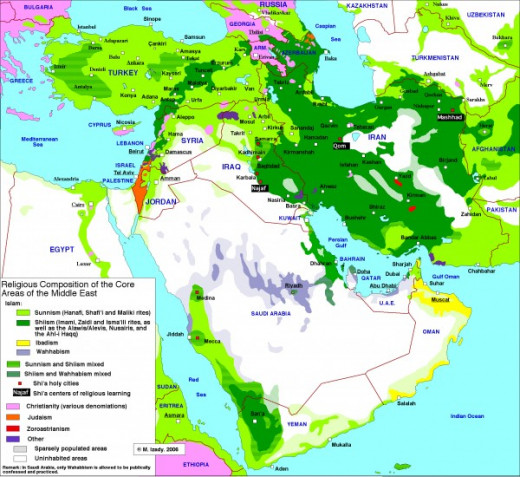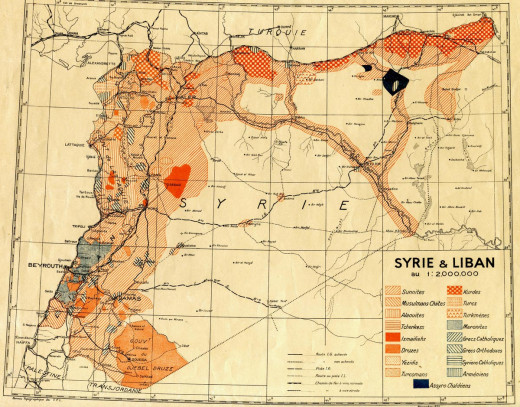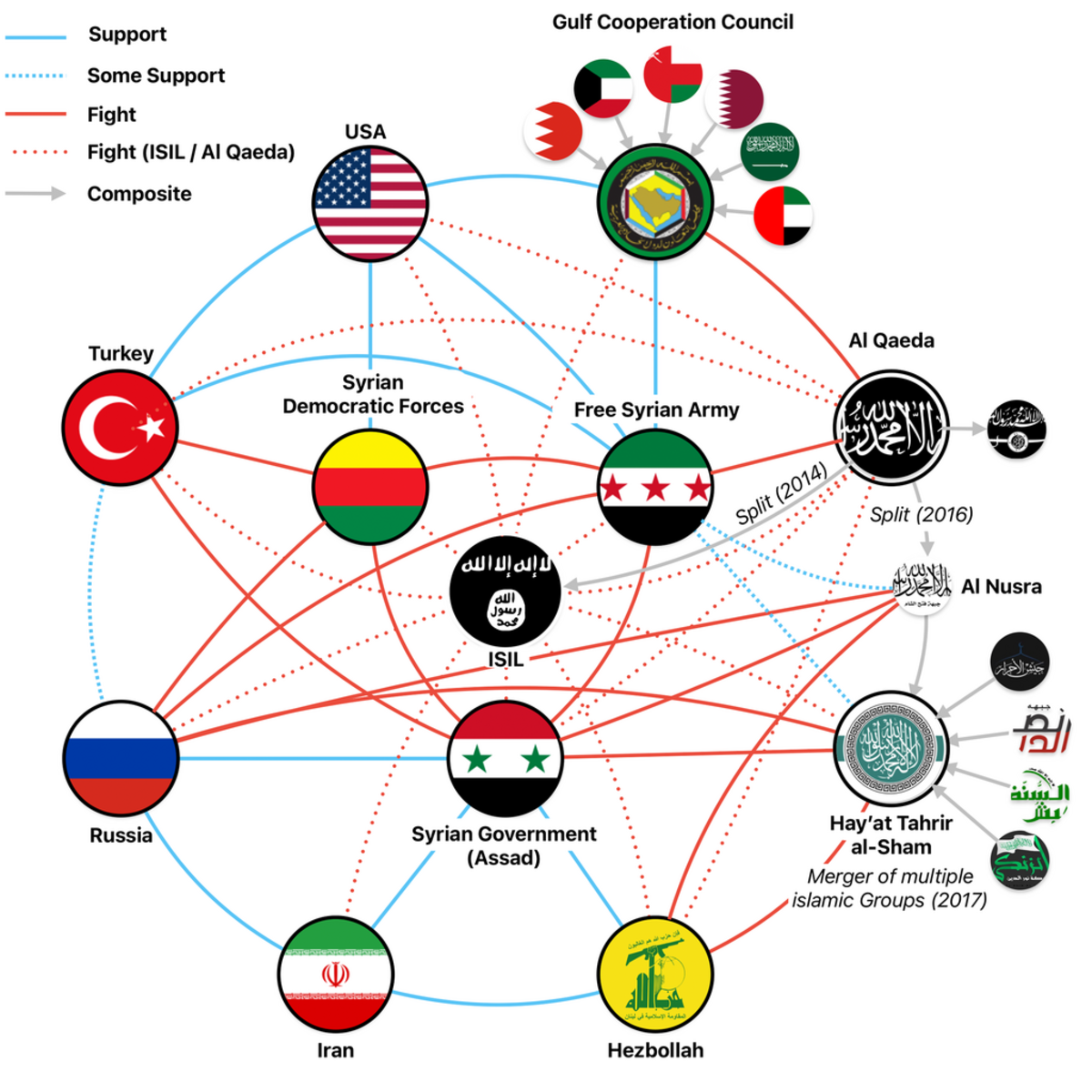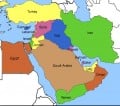What Happens if USA Attacks Syria

In my recent article, Syria: Chemical Weapons or Just a Poor Justification, I highlighted some of the reasons why I do not believe that al-Assad's regime is using chemical weapons against the civil population. There are even more reasons not to believe it, but the ones stated in the article are the most obvious. Today, I will concentrate on possible outcomes of an American intervention.
What is Happening Now
Before we attempt to predict what might happen, we first need to understand what is going on right now. There is a civil war in Syria in which four parties are taking part.
1. Alawite Muslims. This is the government which is dominated by Alawite Muslims, a minority group constituting not more than 14% of Syria's population.
2. Moderate Arab Sunni Muslims. These are the moderate Arab Sunni Muslims dissatisfied with the Alawite dominance in the country and with Assad's regime in general.
3. Sunni Muslim Extremists. These are Sunni Muslim extremists willing to create an Islamic state in Syria.
4. Kurdish Rebels. These are Kurdish rebels in the northern part of Syria who are interested solely in gaining some level of independence from the Arab-dominated Syria.
It must be noticed however, that a significant number of Sunni Muslims support the regime. This was the case with the Sunni cleric, Sheikh Hassan Seifeddine, who was killed by the rebels for expressing support for the Syrian government.
I am fully aware that what has been presented above is full of simplifications, but precise enough to concisely describe the situation in Syria.
The regime is receiving support from Iran and Hezbollah. This is due to the fact that Syria is the only available transport route which Iran can use to provide Hezbollah with weapons and munitions. The other reason is that the Shia Muslim regime in Iran perceives Alawites as fellow Shia Muslims. For Iran, the fall of Syrian regime would be a major strategical failure. First of all, it would weaken Iran's ability to make a military response in case Israel attacked Iran's nuclear plants. Furthermore, the USA's haste to bomb Syria could be explained with nothing else but with Israel's intense lobbying.

The Shia - Sunni rivalry in the Middle East already has a thousand-year tradition. Syria, although the majority of the inhabitants are Sunni Muslims, is being perceived as an important part of Iran's Shia coalition. This is the reason why Arab rebels receive weapons and political support from Saudi Arabia, Jordan and Qatar. It is being reported that many of the provided weapons end up in the hands of Muslim extremists. The war, however, is a part of a power struggle between Saudi Arabia and Iran. The most extreme elements, fighting their Jihad against al-Assad's secular regime, at the same time do the dirty work for Saudi Arabia.
What Happens if USA Attacks Syria?
What happens if USA decides to bomb Syria? Much of it depends on how precisely the intervention would look like. If it would not weaken the regime significantly, it would lead to a prolongation of the war. This would mean more victims and longer destabilization of Syria. In such case, the regime may become interested in a political solution envisaging fragmentation of Syria along the religious and ethnic borders. This would incite further conflict, as those borders are not sharp. Different groups would then continue rivalry for certain territories containing mixed population. If however the intervention would significantly weaken the regime's military potential, the conditions of Syria's fragmentation would be dictated by the opposition. Considering the fact that a significant number of the rebels are extremists, it would mean widespread crimes of ethnic cleansing committed against Alawites and Christians (about 5% of Syria's population). In both cases however, the military conflict would be long and would generate many victims. Al-Assad's allies as well as the allies of the rebels will not give up on Syria easily. Therefore, streams of weapons for both sides of the conflict will be arriving all the time.

But the real danger lurkes on the international arena. For the reasons stated above, Iran would feel threatened by the American intervention. If the regime in Tehran feels threatened enough, it may launch missiles at Israel and incite Hezbollah, as well, to take action against this country. An American reaction on such actions of Iran could incite further Iranian response. The whole Persian Gulf is within the range of Iranian missiles. An Iranian bombardment of oil tankers, oil platforms and oil fields in Qatar and Saudi Arabia could lead to unpredictable perturbations in global economy. Iran would not have much to lose. Due to international sanctions and its rather closed economy, this country's well-being does not depend much on international economic exchange. In such a case, USA would be forced to engage Iran. This country would be an enemy, much more demanding than Saddam Hussein's Iraq, where the American taxpayers have dumped more than three trillion (sic!) USD. The American economy will not endure a next full-scale war. It is also hard to predict how Israel would react to military actions by Iran and / or Hezbollah, and which reactions in the Middle East would such a response farther on trigger.
An American intervention would also increase chances that chemical weapons will actually be used in the area. Not only because the Syrian regime may become desperate. The main threat would be that extremist elements within the Syrian opposition may seize those weapons. Having chemical weapons, al-Queda would not hesitate to use them in Israel, Europe or in any other place which the terrorists would perceive as enemy territory.
We also do not know what countermeasures Assad's regime has prepared in case of an American intervention. Such an intervention was taken under consideration for two years. Enough for any regime to prepare itself for some form of deterrent action. Syrian secret services may already be active on American territory, preparing for attacks on infrastructure such as power stations, dams, ports, roads or railways. Even one successful attack on infrastructure can cause economical losses worth billions of dollars.
Finally, possible prolongation of the conflict and strengthening of the rebel forces increase the risk of the conflict reaching neighboring countries. Clashes between religious groups were already taking place in Lebanon. The real powder keg, however, is not Lebanon but Iraq. The latter country is also a scene of a Shia - Sunni conflict. During the rule of Saddam Hussein, the Sunni minority, about 35% of Iraq's population, held the most prominent positions in the administration and in the ruling Baas party. This has changed after the American occupation. There is a widespread resentment between the Shia and the Sunni in Iraq. Violent clashes and bomb attacks are taking place all the time and there have been cases of Shia government authorities placing Sunni activists under arrests and conducting executions against them. We may be, therefore, sure that as soon as the rebellion achieves a solid foothold in Syria, we would witness a full-scale civil war in Iraq, which would be a new target for extremist Sunni militants equipped with weapons from the Syrian conflict. As the Iraqi army is far from being a significant force, the conflict would once again involve Iranian military assistance and, subsequently, perhaps also military assistance of Sunni Middle East states. This would mean additional hundreds of thousands of war victims.
Conclusion
What we can be sure of is that USA's intervention will lead to no good. There is still time to stop. American political elites must understand that USA's involvement in the Middle East is unneeded and does not serve the interest of a common American. USA has already lost tens of thousands of soldiers and dumped more than a half of its annual GDP in the Middle East. At the same time USA's debt is growing. The moment when China replaces USA as the first economy in the world is getting nearer. In such a situation, American political elites should leave Middle East to its own fate at once. American citizens do not owe any country anything in the Middle East. Therefore conflicts in the region should be resolved between the interested parties. Especially, but not only, if the conflicts are within the world of Islam. Reducing government debt followed by cutting unneeded military expenditures, a policy of energetic self-sustainability based on exploiting shale oil and shale gas, as well as weakening those groups of influence within the American political elites, which make America act contrary to own national interest and on behalf of the interest of other countries, should be enough to enable USA to keep the position. There is still hope, that the elites in Washington learn it before they do something irresponsible in Syria.









